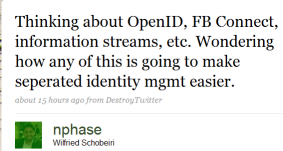The Truth About Agency Blogs, Even Ours
In the world of interactive marketing, the hubs of conversation are most definitely not agency blogs. For all of the talk about embracing web culture, understanding content creation, and taking the dive into social media, there is a gaping lack of collaboration and interaction between digital agencies. We're creative folks with our minds on big things. We understand the new economy, the new technology, and the precise future of advertising. We understand pretty much everything except how to take our critical lens off of our clients and off of media to reexamine ourselves.
The lack of interaction on agency blogs is appalling: no guest posts, rarely @replies on Twitter, and, not surprisingly, a lack of comments on posts. Most of the posts on agency blogs are vain attempts at gaining thought leadership. Of course, very little is actually gained. When a thousand arms reach for the pie in the sky, no one gets very much.
Build Links Like Google
That’s right, Google does a great job at consistently building links with clever, unique, and fun link building tactics. Sure, it’s a lot easier when you publish a single blog post to 501,000 subscribers, but Google remains hungry when it comes to dominating its own search results (and others) for its products and services using well thought out SEO campaigns that attract a lot of links.
How understanding natural biases can make you a better colleague.
Everyone uses cognitive biases to speed up their decision making process. They are as old as decision making itself. The most common bias is "confirmation bias." It's a great description for the tendency of people to blindly accept evidence that supports their theory, but hold in great skepticism anything that undermines their theory. If you've ever read something in order to prove your point in an argument, then you're most likely guilty of confirmation bias.
Why does this matter to you? After all you're a marketer, an entrepreneur or a web guy, not a researcher. It's important because everyone is a decision maker at some point in their work and if you're not aware of the biases that effect you, then you can't be proactive in overcoming them.
The Problem with One Identity
One of my good friends, Wilfried Schobeiri, wrote me an e-mail a few days ago about a trend in social media. He writes:
I was thinking today about OpenID, Facebook connect, twitter's connect thing, Google, friend feed, etc...Twitter shows my thought process:
Reddit Users: Completely Unpredictable Liberal Ninjas
A while back I hacked together a script to scrape Reddit users in order to see what the top submitters were doing. I took three top Reddit submitters: maxwellhill, qgyh2, and MndVirus and started compiling data from my scraper. Some of the things I looked at were:
- url
- title
- score
- category
- root domain
- time of day
I was expecting to find more commonalities than I did, which is why I am publishing this post, but some of the common denominators of their submissions are:
Centralized Commenting: Ripples of A New Era
In light of Google's changes to how they handle no-follow links (check out seomoz's video on this change), Andy Beard has posted an interesting suggestion for bloggers: switch to Disqus. Andy has a variety of reasons for suggesting Disqus, but the main reason that now is the time is because it places all of your comments in an external javascript file, which means that Google won't count all of the externally linking comments on your posts and thereby kill the flow of your Page Rank. I think it's likely that implementing Disqus or a similar centralized commenting system to prevent Google from crawling links in comments will become standard SEO procedure for blogs. In fact, I'm testing it out on my personal blog right now.
Because Disqus makes it easy for bloggers to setup Facebook Connect and other social media login systems on their sites, if Disqus or it's competitors start to see a large amount of new users, it's likely that Facebook Connect will also begin to see a very large increase in adoption. Therefore, the adoption of centralized commenting is likely to be one of many cornerstones for what Jeremiah Owyang calls the Era of Social Colonization, the period in which all sites become social.
